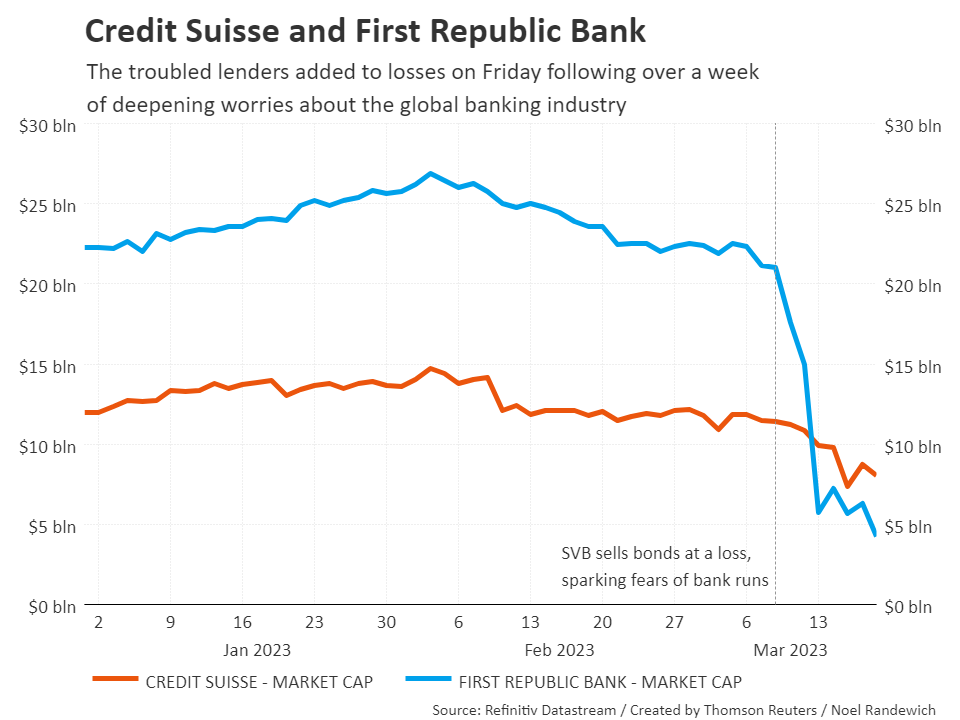March 18 (Reuters) – UBS AG (UBSG.S) is asking the Swiss government to cover about $6 billion in costs if it were to buy Credit Suisse (CSGN.S), a person with knowledge of the talks said, as the two sides raced to hammer together a deal to restore confidence in the ailing Swiss bank.
The 167-year-old Credit Suisse is the biggest name ensnared in the turmoil unleashed by the collapse of U.S. lenders Silicon Valley Bank and Signature Bank over the past week, spurring a rout in banking stocks and prompting authorities to rush out extraordinary measures to keep banks afloat.
The $6 billion in government guarantees UBS is seeking would cover the cost of winding down parts of Credit Suisse and potential litigation charges, two people told Reuters.
One of the sources cautioned that the talks to resolve the crisis of confidence in Credit Suisse are encountering significant obstacles, and 10,000 jobs may have to be cut if the two banks combine.
Swiss regulators are racing to present a solution for Credit Suisse before markets reopen on Monday, but the complexities of combining two behemoths raises the prospect that talks will last well into Sunday, said the person, who asked to remain anonymous because of the sensitivity of the situation.
Credit Suisse, UBS and the Swiss government declined to comment.
The frenzied weekend negotiations come after a brutal week for banking stocks and efforts in Europe and the U.S. to shore up the sector. U.S. President Joe Biden’s administration moved to backstop consumer deposits while the Swiss central bank lent billions to Credit Suisse to stabilize its shaky balance sheet.
Berkshire Hathaway Inc’s (BRKa.N) Warren Buffett has held discussions with senior Biden administration officials about the banking crisis, a source told Reuters.
The White House and U.S. Treasury declined to comment. Bloomberg News reported earlier that Buffett had been in touch with the administration in recent days about the regional banking crisis, Bloomberg News reported on Saturday. The source declined to elaborate on the details of the discussions.
UBS was under pressure from the Swiss authorities to carry out a takeover of its local rival to get the crisis under control, two people with knowledge of the matter said. The plan could see Credit Suisse’s Swiss business spun off.
Switzerland is preparing to use emergency measures to fast-track the deal, the Financial Times reported, citing two people familiar with the situation.
U.S. authorities are involved, working with their Swiss counterparts to help broker a deal, Bloomberg News reported, also citing those familiar with the matter.
British finance minister Jeremy Hunt and Bank of England Governor Andrew Bailey are also in regular contact this weekend over the fate of Credit Suisse, a source familiar with the matter said. Spokespeople for the British Treasury and the Bank of England’s Prudential Regulation Authority, which oversees lenders, declined to comment.
FORCEFUL RESPONSE
Credit Suisse shares lost a quarter of their value in the last week. It was forced to tap $54 billion in central bank funding as it tries to recover from a string of scandals that have undermined the confidence of investors and clients.
The company ranks among the world’s largest wealth managers and is considered one of 30 global, systemically important banks whose failure would ripple throughout the entire financial system.
The banking sector’s fundamentals are stronger and the global systemic linkages are weaker than during the 2008 global financial crisis, Goldman analyst Lotfi Karoui wrote in a late Friday note to clients. That limits the risk of a “potential vicious circle of counterparty credit losses,” Karoui said.
“However, a more forceful policy response is likely needed to bring some stability,” Karoui said. The bank said the lack of clarity on Credit Suisse’s future will pressure the broader European banking sector.
A senior official at China’s central bank said on Saturday that high interest rates in the major developed economies could continue to cause problems for the financial system.
There were multiple reports of interest for Credit Suisse from other rivals. Bloomberg reported that Deutsche Bank was looking at the possibility of buying some of its assets, while U.S. financial giant BlackRock (BLK.N) denied a report that it was participating in a rival bid for the bank.
INTEREST RATE RISK
The failure of California-based Silicon Valley Bank brought into focus how a relentless campaign of interest rate hikes by the U.S. Federal Reserve and other central banks – including the European Central Bank this week – was pressuring the banking sector. SVB and Signature’s collapses are the second- and third-largest bank failures in U.S. history behind the demise of Washington Mutual during the global financial crisis in 2008.
Banking stocks globally have been battered since SVB collapsed, with the S&P Banks index (.SPXBK) falling 22%, its largest two weeks of losses since the pandemic shook markets in March 2020.
Big U.S. banks threw a $30 billion lifeline to smaller lender First Republic (FRC.N), and U.S. banks altogether have sought a record $153 billion in emergency liquidity from the Federal Reserve in recent days.
A coalition of midsize U.S. banks, Mid-Size Bank Coalition of America (MBCA), asked regulators to extend FDIC insurance to all deposits for the next two years, Bloomberg News reported on Saturday, citing an MBCA letter to regulators.
In Washington, focus has turned to greater oversight to ensure that banks and their executives are held accountable.
Biden called on Congress to give regulators greater power over the sector, including imposing higher fines, clawing back funds and barring officials from failed banks.
Reporting by Reuters bureaus
Writing by Lincoln Feast, Toby Chopra and Deepa Babington and Nick Zieminski
Editing by William Mallard, Kirsten Donovan, Hugh Lawson
: .


